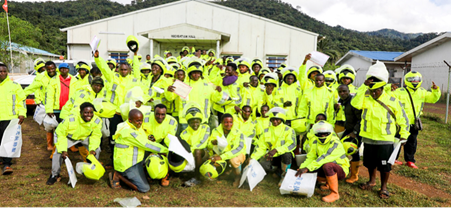On August 12, 2025, the tranquil mining town of Yekepa, nestled in the heart of Liberia, witnessed a concerted effort to address a critical safety concern: motorcycle accidents. ArcelorMittal Liberia (AML), in partnership with the Liberia National Police, orchestrated a comprehensive one-day road safety training program specifically tailored for the region’s commercial motorcyclists. This initiative brought together approximately 150 riders, each of whom received not only vital safety education but also tangible tools to enhance their protection on the road, including a brand-new helmet and a high-visibility reflective jacket. The program underscored a shared commitment to safeguarding lives within the Yekepa community, recognizing the inherent risks associated with motorcycle operation and the disproportionate impact these risks have on young people in Liberia.
The training program delved into the precarious landscape of motorcycle safety in Liberia, bringing to light the alarming statistics from 2024, which revealed that motorcyclists constituted the largest demographic involved in road accidents across the nation. This vulnerable group, predominantly young men between the ages of 18 and 35, often turn to commercial motorcycling as a primary source of income, frequently foregoing formal education to support their families. Recognizing this socio-economic reality, AML’s Health & Safety Department designed the training to address the specific challenges faced by these young riders, equipping them with the knowledge and protective gear necessary to mitigate the risks they encounter daily on the roads.
The training sessions were facilitated by a team of safety experts, including AML Safety Manager Ahmad Massaquoi, AML Transport Coordinator Koffa Slewion, and officers from the Yekepa detachment of the Liberia National Police. Mr. Massaquoi, in his address to the participants, emphasized the critical importance of cautious and responsible riding habits as the cornerstone of preserving life and limb. He underscored the collective responsibility of all stakeholders, including riders, law enforcement, and corporate entities, to foster a culture of road safety within the community. This shared accountability, he argued, is paramount in reducing the incidence of accidents and protecting vulnerable road users.
Mr. Slewion delivered a particularly impactful presentation focusing on the crucial role of helmets in preventing severe head injuries. He vividly described the head as the control center of the human body, containing “everything about us,” and emphasized the profound consequences that head trauma can inflict. Highlighting the potentially devastating, long-term effects of head injuries, even in cases where external injuries appear minimal, Mr. Slewion drove home the message that wearing a helmet is not merely a safety precaution but a vital safeguard against life-altering consequences. He stressed the importance of recognizing the inherent vulnerability of the head in motorcycle accidents and the crucial role helmets play in mitigating this risk.
The Liberia National Police actively participated in the training, reinforcing the message of road safety and emphasizing the legal aspects of responsible riding. Police Commander Horace T. Zeigeay commended AML for its proactive approach to community safety and for providing the riders with essential protective gear. He urged the motorcyclists to internalize the importance of safety, emphasizing that it is ultimately a matter of self-preservation. Commander Zeigeay also highlighted common violations of Liberia’s Vehicle and Traffic Law, drawing attention to risky behaviors such as riding while listening to loud music, using earpieces, wearing inappropriate footwear like slippers, engaging in reckless competition with faster vehicles, and performing dangerous overtaking maneuvers. These practices, he cautioned, significantly increase the likelihood of accidents and jeopardize the safety of riders and other road users.
The training concluded with a palpable sense of shared commitment to road safety. AML, the Liberia National Police, and the participating motorcyclists collectively acknowledged the urgent need to prioritize the protection of life and limb within the Yekepa region. The distribution of helmets and reflective jackets served as a tangible symbol of this commitment, providing the riders with immediate tools to enhance their safety. The event not only equipped the motorcyclists with essential safety knowledge and protective gear but also fostered a sense of collective responsibility for road safety within the community. The collaborative nature of the training, involving both corporate and law enforcement entities, demonstrated a unified effort to address a critical safety issue and safeguard the lives of those who rely on motorcycles for their livelihood. The initiative served as a model for community-based safety programs, showcasing the impact that can be achieved through partnership and a shared dedication to protecting vulnerable road users.


